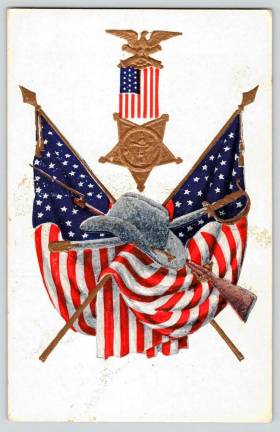
This column is composed a week or so in advance of being printed in the newspaper.
A contentious election will have taken place a couple days before this is published.
With this in mind, it may be of interest to look at another election during a different disruptive time in our nation’s history - one having taken place 160 years ago.
With the spirit of sharing and mutual respect, I have asked esteemed historian Jennie Sweetman to take part in writing this column so we may offer an example of cooperation between Americans.
In 1864, the United States was in the bloody midst of the most tumultuous and deadly time in its history. This was the American Civil War.
The war began in 1861 and ended in 1865. It was the deadliest war in American history. Families were torn apart, with some taking up arms on different sides (as was so during the Revolutionary War).
Long-term arguments over major issues culminated in states seceding from the U.S. and the Union taking military means to bring the renegade Confederate states back in.
Abraham Lincoln had been president since 1861; his election was a major factor in the war beginning. During his presidency, the war raged on and at the time of the 1864 election, the outcome of the Civil War was still in doubt.
Some in his party thought Lincoln couldn’t win re-election and wanted another candidate to replace him, but he remained on the ticket. Some war hawks from the other party had come to Lincoln’s. His main message was national unity.
The other party largely consisted of members who were moderate and looking for peace. Some leaders considered the war to be a failure and wanted to have a negotiated peace to end hostilities.
At their convention, the major issues were war or peace platforms. They chose Maj. Gen. George McClellan, a seasoned West Point graduate from New Jersey who was the commanding general of the Union Army early in the war, as their pro-war presidential candidate; anti-war activist George Pendleton as his running mate; and the peace platform.
How did the election work out? I share the stage here with Jennie as we cooperate to achieve even greater results than individuals or competitors.
Jennie Sweetman:
The year was 1865. Thanks to a truce, the sounds of guns firing and bullets whistling through the air on muddy battlegrounds had been silenced. But here in Sussex County, the war was still raging - perhaps not with warfare ammunition but verbally, with rock throwing and in print. Believe it or not, county residents were sharply divided over the Civil War.
The campaign for governor that year was the Union Party against the Copperheads, with the campaign bitter and the well–attended rallies rather rowdy. Fortunately the campaign was short-lived as the rallies were held only from mid-September to Nov. 6.
Here in Sussex County, the two main opposing speakers were Gen. Judson Kilpatrick on behalf of the Union Party and Andrew Jackson “Jack” Rogers, a thorough Copperhead.
Throughout the campaign, it was reported that when one group held a rally, the others attempted to disrupt it by shouting, throwing rocks, etc. An estimated 2,000 to 4,000 people attended a Union rally Sept. 28 at the Newton Green. Speakers included Gen. John L. Swift of Louisiana and Col. J.C. Bennett.
The duo reminded the audience that they had defeated the rebellion and set the bondsmen free and that it was the duty of the people to bury the putrefying carcass of slavery so deep that it could have no resurrection and to accomplish this by the passage of the constitutional amendment.
At another Newton rally, at which Kilpatrick and Rogers were debating, a Copperhead shouted that Kilpatrick should be hung as he had fought the rebels. When Kilpatrick asked if “they would hang him, a Union soldier, who has done all that he could to save the government from destruction and they would release Jeff Davis from prison and receive him with hurrahs,” the immediate response came loud and clear, “We would.”
So hated was Kilpatrick by some that in November, it was reported that arsonists set fire to a stack of hay on Kilpatrick’s Wantage farm, destroying four or five tons of hay.
If the campaign rallies were rowdy, apparently Election Day proved to be no better.
Newspapers reported that a riot took place in Hardyston Township when several Irishmen employed by the Franklin Mines attempted to vote for the Union candidate, Gov. Marcus L. Ward. Large stones were hurled and several people were badly injured - one very seriously. The bloody riot came to an ending only after it was erroneously rumored that two men had been killed.
As for the election, the Sussex Register charged that the Democrats cast at least 300 illegal votes, accused them of ballot-stuffing with double voting and having more people vote than were on the poll list and even suggested that the unscrupulous Boards of Elections allowed a few legitimate votes to be thrown out, especially in Newton. Especially singled out by the Sussex Register for fraud were the municipalities of Andover, Frankford, Hardyston and Newton.
Despite the charges made by the Register, statewide the Union Party candidate Gov. Marcus L. Ward defeated Col. Theodore Runyon.
The campaign and election over, no investigations related to voting fraud were even considered and eventually the hard feelings, which may have lasted longer than the Civil War itself, faded into the background.
Thank you, Jennie, for sharing. And hopes for peaceful outcomes for America.
Bill Truran, Sussex County’s historian, may be contacted at billt1425@gmail.com